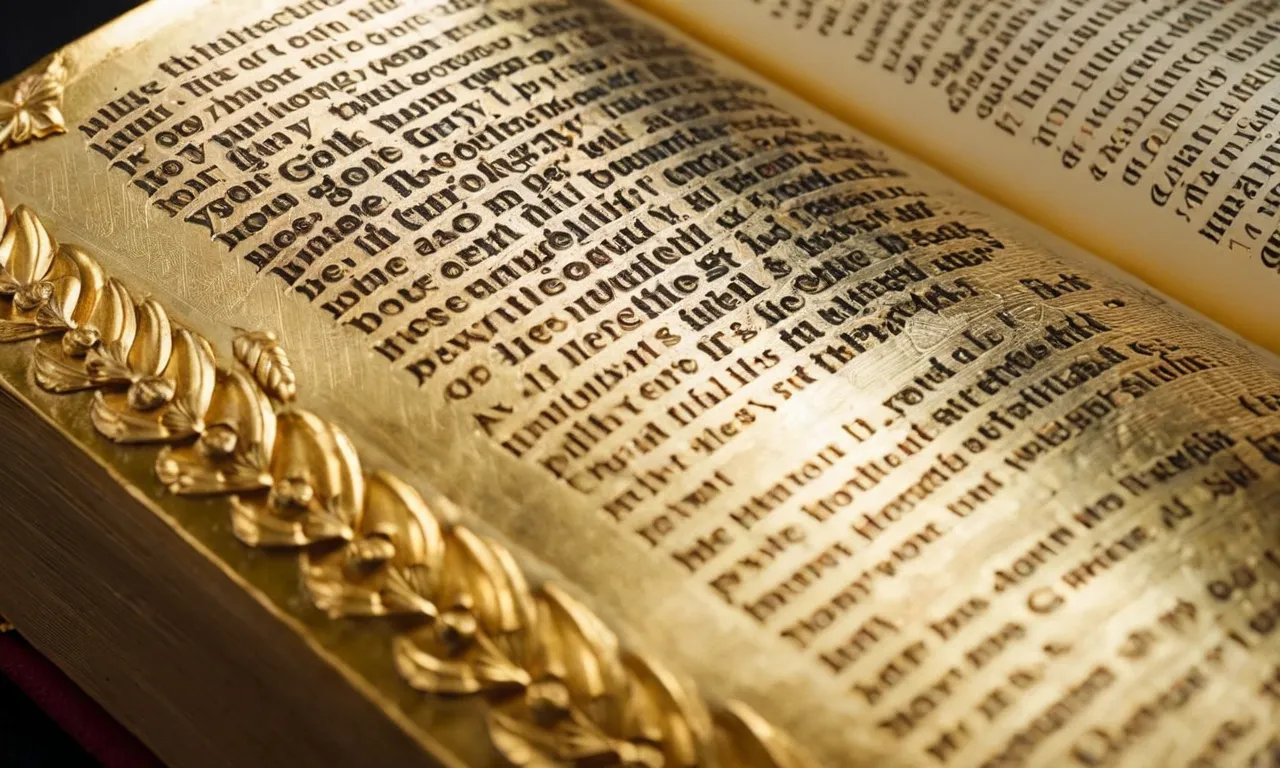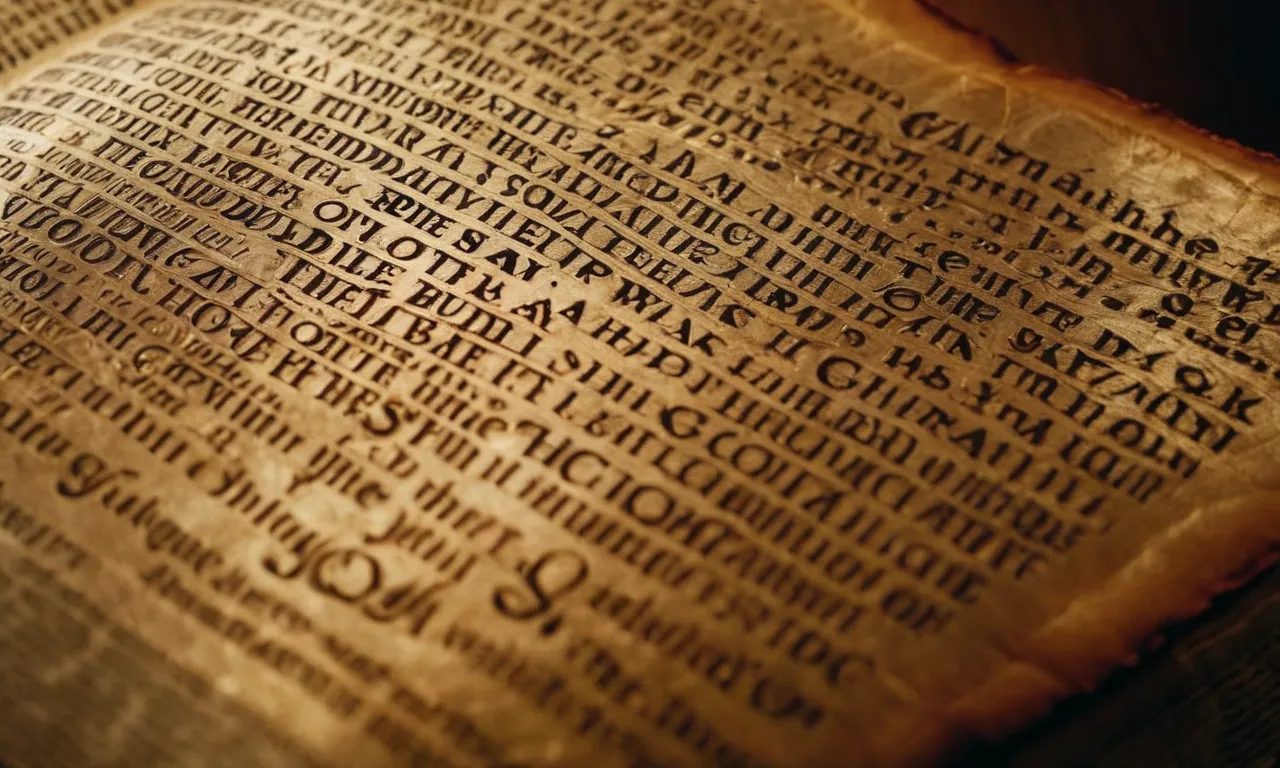Who Is Gaius In The Bible? A Complete Overview
If you’ve ever wondered “Who is Gaius in the Bible? “, you’re not alone. Gaius is mentioned several times in the New Testament, but his identity remains somewhat mysterious.
In this comprehensive guide, we’ll explore everything the Bible tells us about Gaius and the various theories about who he was.
If you’re short on time, here’s the key information you need to know: Gaius is the name of three different men mentioned in the New Testament. The Gaius who appears most often may have been a convert of the apostle Paul in Corinth who showed great hospitality to Paul and the whole church.
Gaius of Macedonia
Gaius of Macedonia is mentioned in the New Testament of the Bible. He is referred to in the third epistle of John, where the apostle John addresses him as “beloved” and commends him for his faithfulness and hospitality.
Although Gaius is not as well-known as some other figures in the Bible, his character and actions provide valuable insights into the early Christian community.
Hospitality and Generosity
Gaius is described as a hospitable and generous individual. In his letter, John praises Gaius for his hospitality towards fellow Christians who were traveling and spreading the Gospel. Gaius opened his home to these missionaries, providing them with food and shelter.
His generosity towards these messengers of God reflects his deep commitment to the Christian faith and his desire to support the spreading of the Good News.
This aspect of Gaius’ character serves as a reminder to Christians today about the importance of hospitality and generosity.
It encourages believers to open their homes and hearts to others, providing a welcoming and supportive environment for fellow believers and those in need.
Opposition and Perseverance
Gaius faced opposition and challenges in his commitment to the Christian faith. John mentions that some individuals within the local church were causing trouble and spreading malicious gossip about Gaius.
Despite these obstacles, Gaius remained steadfast in his faith and refused to let the negativity deter him from his mission.
This aspect of Gaius’ story serves as a reminder that Christians may face opposition and challenges in their faith journey.
It encourages believers to persevere in the face of adversity, staying true to their beliefs and remaining committed to their mission of spreading the love and teachings of Jesus Christ.
Lessons for Today
The story of Gaius of Macedonia provides valuable lessons for Christians today. Firstly, it highlights the importance of hospitality and generosity towards fellow believers and those in need.
It encourages believers to open their homes and hearts, creating a welcoming and supportive community. Secondly, Gaius’ story reminds Christians of the potential challenges and opposition they may face in their faith journey.
It encourages believers to remain steadfast in their faith, refusing to be discouraged by negativity and staying committed to their mission of spreading the Gospel.
Gaius of Derbe
Unfortunately, there is very little information available about Gaius of Derbe in the Bible or other historical sources. The only clear reference to Gaius of Derbe is found in Acts 20:4, which states:
“He was accompanied by Sopater son of Pyrrhus from Berea, Aristarchus and Secundus from Thessalonica, Gaius from Derbe, Timothy also, and Tychicus and Trophimus from the province of Asia.” (NIV)
From this verse, we can gather a few key details about Gaius:
- He was from the city of Derbe, one of the cities Paul visited on his first missionary journey (Acts 14:20)
- He accompanied Paul on part of his third missionary journey as Paul traveled back through Macedonia
- He was likely a disciple or companion of Paul
Unfortunately, without further biblical background or reliable historical sources, little more can be definitively stated about Gaius of Derbe.
There are a few other men named Gaius mentioned in the New Testament (Rom 16:23, 1 Cor 1:14, 3 John 1:1), but there is no evidence conclusively linking any of them to Gaius of Derbe.

Gaius the Host at Corinth
Gaius’ Hospitality Towards Paul
The book of Romans mentions Gaius as Paul’s host while the apostle was in Corinth (Romans 16:23). This Gaius is described as Paul’s dear friend and fellow worker in Christ.
He graciously opened his home to Paul during his missionary travels, providing food, shelter, and Christian fellowship.
Gaius’ hospitality enabled Paul to devote himself fully to preaching the gospel and planting churches, rather than having to worry about daily provisions.
His generosity no doubt brought great encouragement to Paul during an intense season of ministry in Corinth.
This reminds us of the importance of hospitality in the early church. By welcoming traveling teachers like Paul into their homes, believers strengthened the spread of the faith.
They participated in gospel work by supporting the physical needs of those on the front lines of ministry.
Gaius’ Baptism by Paul in Corinth
In addition to hosting Paul, it seems Gaius was converted and baptized by Paul during his time in Corinth. In 1 Corinthians 1:14, Paul says, “I am thankful that I did not baptize any of you except Crispus and Gaius.”
This indicates Gaius was among the early converts who came to faith in Christ under Paul’s teaching.
As one of the first baptized believers in Corinth, Gaius played a key role in the establishment of the church there. He was likely involved in its leadership from the very beginning.
Archaeology confirms there was a Gaius who held a municipal office in first-century Corinth, so this may have been the same man.
Gaius’ Position in the Church
Based on the apostle John’s greeting to him as “dear friend” in 3 John 1:1, Gaius seems to have become an influential leader in the early church. This letter suggests he regularly showed hospitality to traveling teachers and supported their ministries financially.
John commends Gaius’ commitment to the truth and his exemplary walk as a believer.
He says, “It gave me great joy when some believers came and testified about your faithfulness to the truth, telling how you continue to walk in it.
I have no greater joy than to hear that my children are walking in the truth.” (3 John 3-4)
Though little is known about Gaius overall, his reputation for generosity and his firm stand for the faith clearly left a lasting legacy in the early church.
Theories About Gaius’ Identity and Role
Gaius as Titius Justus
One theory is that Gaius may have been the same person as Titius Justus, who is mentioned in Acts 18. Titius Justus was a worshipper of God who lived next door to the synagogue in Corinth. When Paul first came to Corinth, he stayed with Titius Justus (Acts 18:7).
Some scholars believe Gaius and Titius Justus were two names for the same person. This is supported by the fact that Gaius is mentioned as Paul’s host in Romans 16:23, which was written from Corinth.
However, there is debate among scholars about this theory. The name Titius Justus seems to be a Roman name, while Gaius is a Greek name.
It was uncommon, though not unheard of, for someone to have both a Greek and Roman name.
Ultimately, there is not enough evidence to say definitively whether Gaius and Titius Justus were the same person.
Gaius as Paul’s Amanuensis
Another theory is that Gaius is the one who served as Paul’s “amanuensis” or secretary when writing the letter to the Romans.
This theory comes from Romans 16:22 which says, “I, Tertius, who wrote down this letter, greet you in the Lord.”
Some interpreters believe Tertius was the one physically writing down Paul’s words, while Gaius was the one who scribed the body of the letter.
However, most scholars do not find this theory convincing. The role of an amanuensis was simply to write down verbatim what the author dictated.
An amanuensis did not compose the letter himself. Since Romans 16:22 identifies Tertius as the one who physically wrote the letter, it is unlikely Gaius served as Paul’s compositional amanuensis.
He may have served as a host and patron for Paul rather than assisting in the writing process.
While theories abound, the identity and role of Gaius in early church history remains shrouded in mystery. The little biblical information we have about him offers tempting clues, but not enough to draw definitive conclusions.
As with many names in the New Testament, the full story about Gaius awaits revelation in eternity!
Conclusion
So in summary, the Gaius mentioned most frequently in the New Testament appears to be a Christian convert of Paul’s in Corinth.
He showed exceptional hospitality, housing Paul and even the whole church. Some scholars theorize he may be the same person as Titius Justus, another Corinthian disciple.
But his exact identity remains uncertain.
I hope this overview has helped explain everything the Bible reveals about the important early church leader Gaius. Let me know if you have any other questions!








